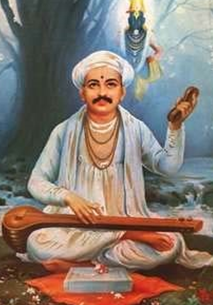Talk:Bhagavān Kṛṣṇa Blesses his Bhakta Puṇḍalika:Sant Tukārāma (1608–1649 CE)
By Vishal Agarwal
Sant Tukārām was a low-caste Hindu who lived a mere 41 years (1608–1649). He lived a very difficult life and lost his money, children, and his honor. He remarried, but the second wife was very cruel to him. He was a very saintly person. Once, the great Hindu emperor Śivājī approached him and requested him to become his guru. Sant Tukārām instead asked him to meet with Svāmī Samartha Rāmadāsa and request him to be his guru instead. Śivājī agreed to Sant Tukārām’s suggestion.
Tukārām wrote thousands of beautiful poems called abhaṅgas in his mother tongue. Crowds of people gathered around him and sang these abhaṅgas with bhakti towards Vitthala. A local paṇḍita named Rāmeśvara Bhaṭṭa became very jealous of Tukārām. He started spreading the rumor that Tukārām’s abhaṅgas were misleading the people about the true teachings of the Vedas and other Hindu scriptures. According to him, it was a sin to sing and listen to these abhaṅgas because only brāhmaṇas could teach others about dharm, and because religious teachings should be given only from Sanskrit scriptures, not through local languages like Marathi in which the abhaṅgas were written.
A meeting of the local paṇḍitas was called, and in an act of great injustice, Tukārām was ordered to throw into the river the books in which he had written his abhaṅgas. With tears in his eyes, he obeyed the command and threw his books into the waters. The people who had gathered to watch the event saw with great anguish the pages of the booklets being carried away by the waters. Tukārām was also ordered not to write any more new abhaṅgas.
This injustice greatly saddened Sant Tukārām. One day, he sat on the banks of the river and cried to Bhagavān Vitthala that what had been done to him was not fair. He said that he had lived a very difficult life, losing all his wealth, his sons, and his first wife, and that his second wife was very cruel to him. But when he wrote these abhaṅgas to Bhagavān, he forgot his sorrows and ill-luck and felt happy that at least Bhagavān loved him. He said he had never complained before, but now even his abhaṅgas through which he spoke to Bhagavān had been taken away from him, and he wondered why Bhagavān did not take his life too.
Tukārām wept and sang his sorrow in the form of an abhaṅga. A miracle happened – as the onlookers watched in surprise, his books reappeared from the waters, with no damage from water to a single page or to the writing.
Tukārām was greatly moved by the mercy of Bhagavān Vitthala and sang that he was sorry to have doubted His love. He said that Bhagavān was more loving than his mother and had shown mercy to a humble man like him. He prayed for the wish to always find a place at Bhagavān’s lotus-like beautiful feet.
Everyone praised the bhakti of Tukārām. Rāmeśvara Bhaṭṭa and his fellow paṇḍitas felt great shame at the miracle and became Tukārām’s disciples. Sant Tukārām’s surviving abhaṅgas number around 4600. Many later Hindu sants and great poets have translated them into other languages because of their beauty.
Story: Sant Tukārām teaches that we should practice living as if it were the last day of our life
One day, a devotee came to Sant Tukārām and asked him how he was so open and free in life, with no secrets, never becoming angry with anyone, and always cool, collected, and together. Instead of answering directly, Tukārām told the man that he knew a secret about him. The man asked what it was, and Tukārām told him that he was going to die in seven days.
As Tukārām was a great saint, the man could not disbelieve his words. He went back home and did all that had to be done in those seven days. He became wonderful with his wife and children, thinking that he had only seven days more to live, and he tried to be the very best he could be.
On the seventh day, someone told Tukārām that the man was now going to die. Tukārām went to see the man and asked him how he had lived for the past seven days, and whether he had been angry with his wife, children, or friends. The man replied that he could not have been angry with anyone if he were to die after seven days.
Tukārām then said that now the man knew his secret of keeping his mind cool, calm, and collected all the time he remembered that particular relationships could end at any moment. This was the secret of Tukārām’s calm and peaceful mind. He lived with an understanding, not with fear, that the next moment could be the last moment.


